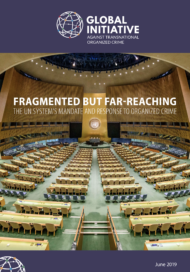After so much talking and political engagement, the failure to achieve a review mechanism for the UN Convention against Transnational Organized Crime is potentially a major blow to its future. Add to that political resistance in a changing global context of organized crime, and it looks increasingly unlikely that the convention can be effectively reinvigorated.
At its adoption by the UN General Assembly in 2000, there was little doubt that the UN Convention against Transnational Organized Crime (UNTOC) – or the Palermo Convention, as it is known – was a major achievement of international cooperation. Confronting the complex issue of organized crime was no minor feat, particularly given that, at the time, it was not widely seen as falling within the UN’s traditional ambit of state-centric security.
The convention was pushed forward as a result of the proactive work of a few states, in particular Italy. The assassination in 1992 of Giovanni Falcone, an anti-mafia prosecuting magistrate and judge (the 25th anniversary of which was recently observed at the General Assembly), galvanized the international community’s efforts and drove forward the adoption of the convention (signed, symbolically, in Palermo, home of the Sicilian mafia).
However, as with any convention, its success lies in its implementation, not its adoption. In the years since its adoption, the coherent vision that originally underpinned the convention and international efforts to counter organized crime have sadly been lost. More broadly, multilateral response to organized crime (across UN bodies and throughout the international community) has been slow and disjointed, led by a fragmentary UN system of governance where mandates are often duplicated across different structures.
Implementation of the convention has become bogged down in technicalities, first and foremost the struggle to develop a functional review mechanism. As detailed previously on UNTOC Watch, opinion on this issue is sharply divided between countries and there is little indication of an imminent resolution. An enormous amount of diplomatic energy has gone into these discussions, without any clear outcome. Despite the importance of the topic, there has been little publicity of these efforts.
Of course, achieving a review mechanism is no end in itself, but it would at least provide a set of activities within the wider landscape of progress on UNTOC and a focus on its implementation. As things stand, there is little concrete understanding of how the convention is being implemented globally. Without an effective system of review, the convention may shrink into irrelevance with no pressure imposed on states through checks on what they have done to meet its provisions.
Political resistance impeding the convention
But why have the vision and drive behind UNTOC been lost? Contrary to what hair-splitting over technicalities such as the review mechanism might suggest, the issue is not technical or process-based, but, arguably, political. The obfuscating technical debates serve as a proxy for broader, more contentious issues, which the diplomats often prefer to leave unspoken.
First, some UN states are sceptical about seeing organized crime (and, by extension, law enforcement and justice systems) as a peace and security issue. These areas are often inextricably linked with ideas of state sovereignty, and are consequently seen as outside the remit of international organizations. Greater international oversight, through implementation of UNTOC and its review processes, is seen as an unacceptable level of UN interference. This is effectively a walk back on the original intent of the convention, despite the now regular appearance of the term ‘organized crime’ in Security Council resolutions, among others.
Secondly, since the post-Cold War consensus, which enabled global states parties to come together and negotiate UNTOC, the nature of transnational organized crime has changed beyond all recognition. As the world economy has globalized, so has its illicit counterpart economy. Organized crime now reaches into all parts of the globe and into many international markets where vulnerabilities may be exploited. To take one example of such change, when UNTOC was first signed the term ‘organized crime’ was not often used in application to Africa. Today, the continent is understood as playing a major role in the global illicit economy.
At the same time, new challenges posed by organized crime have arisen, such as the exploitation of modern technology for criminal enterprise and growing interconnections between organized crime, terrorism and conflict. As a 2010 report from the International Peace Institute argues, if organized crime might once have been conceptualized as hierarchical mafia-style organizations dominating criminal markets, this is now a thing of the past. The way contemporary crime works is far more fluid and dynamic. The dramatic increase in Security Council resolutions relating to forms of organized crime demonstrates its pressing importance as a threat to global stability.
The slowly evolving convention has not kept pace with this changing reality. Moreover, thanks to the growing influence of organized crime in international markets, the increasing consideration of the issue in debates on international security, and its ever-growing impact on political processes around the world, it is now a far more geopolitically contentious problem than when UNTOC was first negotiated. Finding consensus among states parties at political loggerheads with one another in order to drive implementation of UNTOC has become increasingly difficult
Then, there is also the thorny question of links between organized-crime groups and states parties themselves. That’s a tough one to understand, let alone broach as part of negotiations, but it is an issue that cannot be disregarded. Suffice to say that the struggle to implement UNTOC reflects how the convention has fallen foul of the broader political-economic trends of which transnational organized crime is today part. Particularly evident here is the clear drive to exclude independent views of state response and complicity. On the ground, that is reflected in the closing space in which civil society finds itself operating in many countries and the degree to which independent journalists reporting on organized crime have come under threat in many countries, including in previously safe spaces, such as the European Union, as the recent assassinations of journalists in Malta and Slovakia attest.
Although the convention may have its problems, it remains the major legislative instrument through which to counter organized crime and a vital resource for building a more coherent international approach. However, it will remain relevant only to the extent to which it is implemented. A frank discussion of the issues that are really at stake rather than cynical obstruction over technicalities – in other words, calling a spade a spade – is needed to reinvigorate the convention’s original vision.
La UNTOC, en un callejón político sin salida
Después de tanto debate y compromiso político, no lograr un mecanismo de examen para la Convención de la ONU contra la Delincuencia Organizada Transnacional puede poner en riesgo su futuro. Agreguémosle a esto la resistencia política en un contexto mundial cambiante en términos de delincuencia organizada, y parece cada vez menos probable que la convención logre ser revitalizada.
Al momento de su adopción por la Asamblea General de la ONU en el año 2000, casi no existían dudas de que la Convención de la ONU contra la Delincuencia Organizada Transnacional (UNTOC) – o Convención de Palermo – era un logro muy importante en materia de cooperación internacional. Enfrentarse al problema complejo que supone la delincuencia organizada no fue un logro menor, particularmente teniendo en cuenta que, en aquel entonces, no era visto ampliamente como un tema que recayera en el ámbito tradicional de la ONU sobre seguridad centrada en el Estado.
La convención se puso en marcha como resultado del trabajo proactivo de algunos pocos Estados, en particular de Italia. El asesinato en 1992 de Giovanni Falcone, el juez de instrucción que luchaba contra la mafia italiana (cuyo 25º aniversario fue recordado en la Asamblea General), galvanizó los esfuerzos de la comunidad internacional y llevó a la adopción de la convención (suscrita simbólicamente en Palermo, hogar de la mafia siciliana).
Sin embargo, como con cualquier convención, su éxito yace en su aplicación, no en su adopción. En los años posteriores a su implementación, la visión coherente que respaldó originalmente la convención y los esfuerzos internacionales contra la delincuencia organizada, lamentablemente, se han perdido. En términos generales, la respuesta multilateral a la delincuencia organizada (en todos los organismos de la ONU y en toda la comunidad internacional) ha sido lenta y desarticulada, dirigida por un sistema de gobierno de la ONU fragmentado en donde los mandatos mucha veces se repiten en diferentes estructuras.
La aplicación de la convención se ha empantanado en tecnicismos, principalmente en las dificultades para crear un mecanismo de examen funcional. Como lo mencionamos en un artículo anterior de esta serie, la opinión sobre este asunto se encuentra dividida y hay pocos indicios de que podamos ver una resolución inminente. En estas discusiones se ha puesto una enorme cantidad de energía diplomática que no ha generado resultados claros. A pesar de la importancia de este tema, los esfuerzos han pasado casi desapercibidos.
Desde luego que lograr un mecanismo de examen no es un fin en sí mismo, pero por lo menos ofrecería una serie de acciones dentro del progreso general de la UNTOC y un foco en su aplicación. Como están las cosas, no se sabe concretamente cómo se está aplicando la convención a nivel mundial. Sin un sistema efectivo de evaluación y sin que se imponga ninguna presión sobre los Estados mediante controles sobre la aplicación de las disposiciones de la convención, la UNTOC puede ir camino a la irrelevancia.
La resistencia política como obstáculo para la aplicación de la convención
Pero ¿por qué se perdieron la visión y el impulso detrás de la UNTOC? Contrario a lo que las podría sugerir tener diferentes posturas sobre los tecnicismos, el problema no es técnico ni tiene relación con procesos, sino que es más bien político. Los confusos debates técnicos sirven para tapar asuntos más contenciosos que los diplomáticos muchas veces prefieren no tocar.
En primer lugar, algunos Estados miembros son escépticos en ver a la delincuencia organizada (y por tanto a los sistemas de seguridad y justicia) como un asunto relativo a la paz y la seguridad. Estas áreas a veces son relacionadas inextricablemente con ideas sobre soberanía estatal y, consecuentemente, se considera que las organizaciones internacionales no tienen jurisdicción sobre ellas. Consideran que el nivel de interferencia que supondría una mayor supervisión internacional, mediante la aplicación de la UNTOC y sus procesos de evaluación, sería inaceptable. Este es decididamente un paso hacia atrás en el objetivo original de la convención, a pesar de que el término “delincuencia organizada” es ahora recurrente en las resoluciones del Consejo de Seguridad y otros órganos.
Segundo, desde el consenso que le sucedió a la Guerra Fría, que le permitió a los Estados Parte reunirse y negociar la UNTOC, la naturaleza de la delincuencia organizada ha cambiado a un nivel irreconocible. Conforme la economía mundial se globalizó, también lo ha hecho la economía ilícita. La delincuencia organizada ahora llega a todos los rincones del mundo y a muchos mercados internacionales en donde pueda sacar algún beneficio de las vulnerabilidades. Como ejemplo de este cambio, cuando la UNTOC fue suscrita, el término “delincuencia organizada” no se utilizaba muchas veces sobre África. Hoy en día, se considera que el continente juega un papel central en la economía ilícita mundial.
Al mismo tiempo, la delincuencia organizada ha planteado nuevos desafíos, como la explotación de la tecnología moderna para crear empresas criminales, y un vínculo más estrecho entre delincuencia organizada, terrorismo y conflicto. Como sostiene un informe de 2010 del Instituto Internacional para la Paz, si una vez se definió a la delincuencia organizada como organizaciones jerárquicas de estilo mafiosas que dominaban mercados ilícitos, esto ha quedado en el pasado. La forma en la que funciona la delincuencia contemporánea es mucho más fluida y dinámica. El incremento drástico en el número de resoluciones del Consejo de Seguridad relacionadas con formas de delincuencia organizada demuestra su apremiante importancia como amenaza para la estabilidad mundial.
La evolución de la convención no le ha seguido el ritmo a esta realidad cambiante. Además, gracias a la creciente influencia de la delincuencia organizada en mercados internacionales, la mayor consideración del asunto en debates sobre seguridad internacional, y su creciente impacto sobre los procesos políticos alrededor del mundo, es ahora un problema geopolíticamente contencioso mayor al que era cuando la UNTOC fue negociada. Hallar el consenso entre Estados con posturas políticas opuestas es cada vez más difícil.
También está la controvertida cuestión de los vínculos entre la delincuencia organizada y los propios Estados Parte. Este es un tema complejo de entender, y más aún de traer a colación durante las negociaciones, pero que no puede ser desatendido. Sobra decir que la dificultad para aplicar la UNTOC refleja cómo la convención se ha convertido en una víctima de las tendencias políticas-económicas generales, de las cuales la delincuencia organizada transnacional es hoy parte. Aquí es especialmente evidente la clara motivación para excluir opiniones independientes sobre la respuesta y la complicidad estatal. En el terreno, esto se refleja en el espacio cada vez más pequeño en el que opera la sociedad civil en muchos países, incluyendo en sitios antes seguros, como la Unión Europea, tal y como testifican los recientes homicidios de periodistas en Malta y Eslovaquia.
Aunque la convención puede tener sus problemas, sigue siendo el principal instrumento legislativo contra la delincuencia organizada y un recurso vital para construir una estrategia internacional más coherente. No obstante, seguirá siendo importante sólo en el grado en el que se la aplique. Se necesita un debate franco de los asuntos que están realmente en juego, en lugar de ser cínicos y poner tecnicismos como obstáculos – en otras palabras, llamar al pan, pan – para revitalizar la visión original de la convención.



